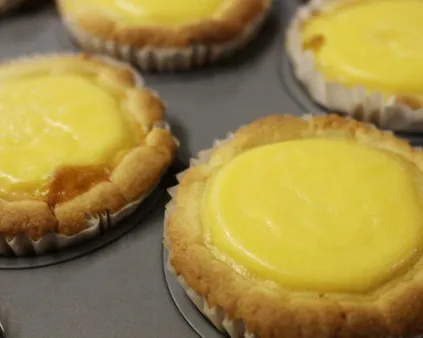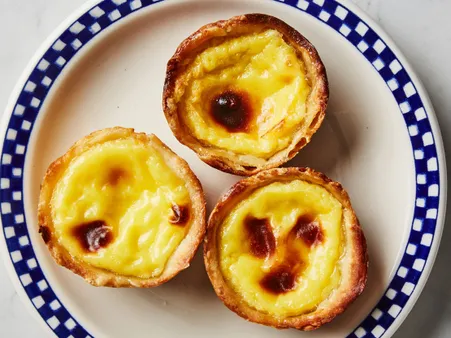Table of Contents
When you think of egg tarts, your mind might wander to Portugal, but Spain offers its own delightful take on this beloved pastry. At tauhuichiban, we're passionate about exploring global cuisines, and the spanish egg tart, with its unique history and flavorful variations, is a must-try. Join us as we uncover the secrets of this Spanish treat, from its Moorish influences to tips for achieving that perfect golden crust.
Spanish Egg Tart Type | Key Ingredients | Origin | Distinctive Features |
|---|---|---|---|
Técula-Mécula | Almonds, eggs, sugar, lemon | Andalusia, Spain | Crumbly pastry, sweet almond filling, historical significance |
Imperial Almond and Egg Tart | Almonds, eggs, lard/butter, sugar, lemon | Extremadura, Spain | Rich, buttery crust, thick almond filling, associated with Emperor Charles V |
Other Regional Variations | May include different nuts, spices, or flavorings | Various regions in Spain | Reflect local culinary traditions and ingredient availability |

The Absolute Best Spanish Egg Tart Recipe
Unveiling the Spanish Egg Tart: TéculaMécula
Imagine a pastry so delicious, it's named after a phrase that means "for you, for me." That's the Técula-Mécula, a Spanish egg tart with a history as rich as its flavor. This sweet treat has been around for centuries, its origins tracing back to the Moorish influence on Spanish cuisine. The name itself whispers of shared joy and generosity, a perfect way to describe the experience of biting into this golden-crusted delight.
Ingredient | Role in the Tart |
|---|---|
Almonds | Provide a nutty, rich flavor and a slightly crumbly texture |
Eggs | Create a creamy, custard-like filling |
Sugar | Adds sweetness and balances the richness of the other ingredients |
Lemon | Offers a bright, citrusy note that complements the almond flavor |
One time, I was visiting Spain and stumbled upon a bakery filled with these beautiful Técula-Méculas. The aroma was intoxicating, a blend of sweet almond and buttery pastry. I couldn't resist trying one, and it was truly a revelation. The crust was flaky and buttery, the filling rich and creamy, and the subtle tang of lemon added a delightful complexity. It was like a mini celebration in my mouth!
- The Técula-Mécula is a symbol of Spanish culinary heritage.
- It's a testament to the influence of Moorish culture on Spanish cuisine.
- It's a delicious treat that's perfect for any occasion.

Unveiling the Spanish Egg Tart: TéculaMécula
A Journey Through Spanish Egg Tart Variations
From Andalusia to Extremadura: A Taste of History
When you think about Spanish egg tarts, you might imagine a single recipe, but Spain is full of surprises! Each region has its own twist on this classic dessert. For instance, in Andalusia, they make the Técula-Mécula tart, which is like a sweet hug from history. It's got almonds and lemon zest that dance together in your mouth. Then there's the Imperial Almond and Egg Tart from Extremadura, favored by Emperor Charles V himself. This one has a crust made with lard and butter, giving it a rich flavor that makes you feel like royalty.
Regional Twists: More Than Just Almonds
But wait, there's more! In other parts of Spain, they might add different nuts or spices to their egg tarts. Imagine biting into a tart filled with hazelnuts or maybe even a hint of cinnamon. These variations are not just about taste; they tell stories of local traditions and what ingredients are available nearby. It's like each tart is a little piece of Spanish history wrapped up in pastry dough.
Region | Distinctive Ingredient |
|---|---|
Andalusia | 'Almonds and Lemon Zest' |
'Extremadura' | 'Lard for Crust' |
'Other Regions' | 'Varied Nuts/Spices' |

A Journey Through Spanish Egg Tart Variations
Baking Tips for the Perfect Spanish Egg Tart
Imagine you're trying to make a Spanish egg tart, but it's not turning out quite right. The crust is too soggy, the filling is too runny, or maybe it's just missing that "je ne sais quoi" that makes it truly special. Don't worry! I've got some tips that'll help you bake a Spanish egg tart that's so good, it'll make you want to dance a flamenco!
Tip | Explanation |
|---|---|
Chill the Dough | Think of the dough as a sleepy little bear – it needs to rest in the fridge for a while before it can be a star in your tart. Chilling the dough makes it firmer and easier to work with, so it won't spread too much while baking. |
Blind Bake the Crust | This is like giving your crust a little head start. It's like baking the crust without the filling, which helps it get crispy and prevent it from getting soggy from the filling. |
Don't Overbake | You don't want your tart to be a burnt offering! Keep a close eye on it and take it out of the oven when it's golden brown and set. You can always bake it a little longer if you want it to be more brown, but don't overdo it. |
Remember, baking is all about practice and patience. If your first attempt doesn't turn out perfectly, don't give up! Just keep trying and you'll eventually create a Spanish egg tart that's worthy of the Spanish royalty themselves.

Baking Tips for the Perfect Spanish Egg Tart
Final Thought
From the charming history of the Técula-Mécula to the regional variations and tips for baking the perfect tart, exploring the world of Spanish egg tarts offers a delightful culinary adventure. So why not embark on this journey yourself? Gather your ingredients, embrace the warmth of Spanish baking traditions, and treat yourself to a taste of Spain's sweet heritage.